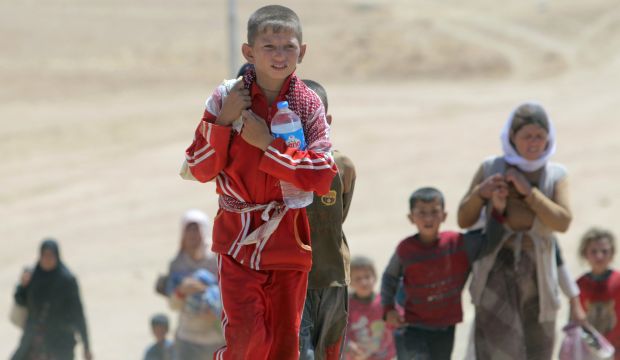Issa is 10 years old. His whole life has changed since the Syrian conflict began. The streets where he lives are filled with destroyed buildings. He cannot attend school. Most of his friends have died or gone. Because of the war he is now a child worker in the Free Syrian Army’s arms factory in Aleppo, alongside his father. He carries shells and repairs rocket launchers. His life now consists of weapons, war and death.
But Issa is not alone here, of course. Nearly half of Syria’s population of 22 million has been displaced, 75 percent of them women and children. The US occupation of Iraq left 5 million orphaned children behind. The latest crisis in Iraq has made the situation even worse for children. In addition to those exposed to violence, many of the displaced, refugees, and those starving up in the mountains are children. Let us remember that children make up 37 percent of the population of Iraq.
The damage done to children by war goes further than death and physical injury. Children are also trained as soldiers in almost all areas where there are civil wars and where radical organizations and guerrilla forces replace regular armies. Child soldiers are known to be used in Afghanistan, Lebanon, Syria, and particularly in Iraq by ISIS, and some have even been trained as suicide bombers. Majed, a 16-year-old Al-Nusra Front child soldier, said that many children like him joined the organization in the town of Dera’a on the Jordanian border, were trained as snipers, and carried equipment to the front; some have long since lost their lives. Yet we are unaware of the precise number of these children forced into war. They never appear on the lists of dead soldiers or dead victims.
The picture in Africa, which has been largely abandoned by the world, despite its wealth, is deplorable. Children are conscripted in eight countries in Africa because of problems with terrorism. Many terror organizations in conflict regions across the world use children to fight. In the Democratic Republic of Congo, which has an appalling record, thousands of children have died in civil conflict since the 1990s.
Other organizations that use child soldiers are the Seleka and Anti-Balaka militias in the Central African Republic and Boko Haram in Nigeria. Readers will recall that children represented the majority of both agressors and victims during Sierra Leone’s civil war.
War is not the only problem facing children in Africa. According to the UN Food and Agriculture Organization, 842 million people went without adequate food during 2011–2013. According to World Food Program figures, 3 million children die of malnutrition each year.
Although the situation in Africa is particularly bad, the situation is also troubling in other countries. Afghanistan and North Korea are some of the countries in Asia most troubled by hunger. According to the UN, 55 percent of children in Afghanistan are stunted due to malnutrition. According to The Lancet medical journal, in the world as a whole in 2011, the equivalent of one child under 10 years of age starved to death every 10 seconds, every hour of every day.
Jean Ziegler, a member of the UN Human Rights Council, said in 2012 that our planet has sufficient resources to feed 12 billion people, almost twice its current population. He adds, “If today people are still starving, then this is organized crime, mass murder.”
How ironic that in a world of selfishness, where money is hoarded instead of being used, where ethnic, religious and ideological radicalism can easily lead to war and conflict, it is children, who do not even know the meaning of these words, who pay the price.
Children know no hatred, anger or jealousy; they are unaware of a world dominated by hatred and anger. As they are trained to fight they cannot realize why they are being propelled into conflicts that are meaningless to them. They are naïve, tender and unable to defend themselves. It is they who die the most easily. It is they who feel most defenseless and who are most uneasy about being unable to adapt to the ruthless world of adults.
They do not deserve to be dragged from the ruins of bombed houses, to stand guard by the bodies of their families slaughtered in war, or to have to play in the muddy fields of refugee camps. Children are a source of joy, the future. Can you imagine the kind of tragedy that is presaged by depriving them of their joy and making them part of a system which turns them into killers? Should we not be raising them as the hope for the future, as envoys of love and peace? Or are some people determined, as they have abandoned their own love, to deprive them of the love with which they were created?

Trackbacks/Pingbacks